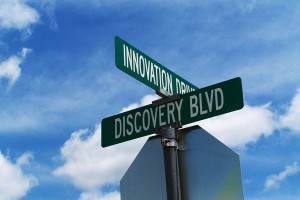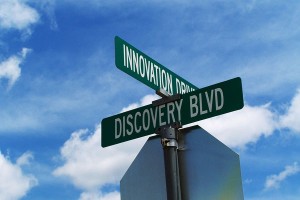If you have the perseverance to read this article, you will be able to identify which category of person you are. Do you have the mentality of innovation or discovery?
A flyover of the differences between the two are simply understood this way… In innovative ventures, there is the all important rule…and it is this…
That’s the code of the innovative organization. You follow the rules, restrictions, and systems, because we believe they’re up-to-date, effective, and correct, and that’s what makes us who we are.
In innovative ventures, obedience is its own reward, is required, and is prized.
Innovators…
 Webster says that innovation is, “to make changes, or do something in a new way.” In Non-webster terms I would say it this way. Innovation is to take something old and make it useable in a new way. Innovation is reformation. Innovation is often the act of taking something that worked over there and adapting it, so it works over here in a better way than it worked over there.
Webster says that innovation is, “to make changes, or do something in a new way.” In Non-webster terms I would say it this way. Innovation is to take something old and make it useable in a new way. Innovation is reformation. Innovation is often the act of taking something that worked over there and adapting it, so it works over here in a better way than it worked over there.
Is this a bad thing? No. I’m not opposed to the product that innovation creates, I’m disturbed by what the innovation process does to the innovators.
To innovate something usually requires an attitude of, “needs improvement.” Such an attitude is not necessarily a bad thing. Great leaders have the ability to see what’s not working and make necessary changes. The tricky part is, an attitude of “that needs improvement” is usually preceded by an attitude of “I can do it better.”
It’s very difficult to be humble with an “I can do it better,” attitude, and the frustrating thing is, this naturally breeds arrogance.
There are some common errors that innovators make that create their own demise. The Wall Street Journal recently came up with a list of 5 commons mistakes of Innovators. I will give a brief description of the mistakes and if you want to read the full article you can go to this link and read the details.
The 5 common errors of Innovators…And I added a sixth.
1. You believe your own numbers and stats. You insist on “seeing the numbers” too soon and all you have to base your numbers on, is your current statistics, compared to your past.
2. The Success Trap. When a company gets success, it easily can focus on what they think is the thing that made them successful. This focus on “what got us here” causes a crowding out of other options, especially from new people that have joined you. This causes success fragility. In their book “In Search of Excellence,” by Peters and Waterman, the authors tell the fate of 43 companies recently leading the world that got caught in this trap. Today only 5 of those 43 companies even exist.
3. Believe they know the competition. The innovative company tends to make huge mistaken identity gaffs when it comes to identifying the competition. Ask the innovative CEO, “Who is your competition?” They will usually reply with the company that is most like them. The problem with this is that history proves that our greatest competitors usually come from a different angle. i.e. Shipping companies suffered from the steam engine, newspapers are in trouble because of the internet, watch companies suffer because of time being displayed on mobile phones.
4. Believe that because everybody had always done it this way, it is the best way of doing the next “new” thing. When America landed on the moon…Innovation built the rocket, the space suits, space food, etc. But innovation is not what Neil Armstrong used when he put his hand on the door hatch and opened the door to outer space to take his first step onto the moon’s surface. That was sheer discovery…no longer could innovation be used. Talk about a humbling moment.
5. Asking the customers for their opinion. The innovative company is really good at answering the questions that their non-customers never ask. The customers have already bought into the company. Why are we asking them what they want? It actually gets worse…Think about it, the company’s leadership team, that has innovated its idea from an old idea, is now sitting around the table making decisions based off of what has been done to try to keep going to next levels.
6. Stop taking real risks. Most innovative companies are led by people who ultimately are not risk takers. There is a difference between risk taking and calculated risk taking. Innovative Leaders are safe “risk” takers. They only take calculated risks with what they understand. The problem with this lies in the fact that if you are the company in the lead…which means nobody has gone before you on this journey…you can’t calculate what to do, because their has been nothing done before you to calculate. There is nothing to do but risk. Companies in the lead usually end up not being in the lead anymore, because the Leader ran out of ideas to innovate.
Innovation is good. Discovery is Great! Let’s break down discovery…
Webster says that Discovery is, “The act of finding or learning something for the first time.”
My heart beats faster, just after reading that definition. You’ve read the headlines…“Her research led to a number of important discoveries. Discovered a talented musician. Voyage of discovery. It was one of the most important discoveries in the history of _____________!”
Discovery!
Think of Lewis and Clark and their expedition of discovery. It required teamwork. It required admitting that they had no clue what they were going to really encounter. Discovery has a knack of showing all involved that they are not in control. Discovery forces all involved to admit this phrase; “I don’t know!” Therefore, discovery creates humility.
Here’s what is exciting to me about the key difference between innovation and discovery. I wrote earlier that Innovation breeds arrogance. What’s evident about discovery, is that it breeds humility.
An arrogant person thrust into an environment of discovery will be forced to become humble. Humility is born and bred in the middle of uncertainty and danger. Opening yourself or your organization to uncertainty and danger creates humility.
Discoverers have to rely on and trust each other. Which team would you rather work on? Innovation or Discovery? In his book, “Good to Great,” Jim Collins differentiates between Levels 1,2,3,4, & 5 leaders. Collins talks about how level 4 leaders and level 5 leaders can produce very similar results, but a key difference between a level 4 leader and a level 5 leader is humility or lack there of. Level 5 leaders always lead through humility. Level 5 leaders tend to lead companies with the reputation for being Discovery oriented. By the way, if you doubt you are a humble leader, then you are humble.
A good example of creating humility through discovery would be taking an innovative person, as described earlier, and put them in the front of a raft as everybody White Water Rafts down some grade 5 rapids. The typical innovative person will have their arrogance washed away (in this case maybe literally). This setting of discovery forces arrogance to morph into humility.
A quick comparison of Discovery and Innovation. Innovation focuses on the outcome and results. Discovery focuses on the cause and the behavior, while on the journey, no matter the end result.
When it comes to discovery, the most important things are not at the end of the Journey, its what develops and shapes along the journey that makes champions.
Discovery is all about the mentality of facilitating the progress and purpose of others. Discovery is fun along the way because of the thrilling unknown yet to be discovered, and it cannot be about you. It has to be about others, especially your teammates. This kind of work environment is thrilling.
The attitude of discovery has no silos among the team. Innovative environments create hierarchies and power pyramids and is led by bosses that control and measure according to a predetermined end result they will strive to achieve at all costs.
Discovery creates circles of people that honor and trust each other’s strengths. This silo-less discovery team, has a leader without a Boss mentality. The buck must stop somewhere, but the buck stops with the one who is the functional leader. A true leader is one who naturally facilitates the purpose and progress of all the others in the circle.
There is no “Boss Mentality” in the circle of discovery. Why? Because when you are out discovering and the “boss” finds himself in quicksand, the boss mode just got stuck. They are now the beggar, and now that they are helpless, depending on how they treated their “subordinates,” they might be left to die and it all be covered up as a tragic accident!
The Innovative Mentality is focused on the orgs final results and goals.
The Discovery Mentality isn’t focused on the organization as much as it focuses on the environment within the organization.
The Discovery Mentality is full of observation towers, not silos. It discovers from its own customer but is overloaded with interaction with the lives of others outside its own company…a team on discovery!
A company of discovery never polls its own, only interacts. You can’t poll something that is yet to be discovered and so the company of discovery is full of trial and error.
It has a culture of discovery and grace. How many times did Abe Lincoln fail? How many times did Albert Einstein fail? With unknowns around every corner, discovery keeps you and the team humble. It has a great sense of humor and often laughs at itself. It has a mentality of meshing and sharing with others. It has a trust in every individual in the company to utilize and expand on their own personal expertise and strengths. Team and Trust are a must in Discovery Companies. The company of discovery has an attitude of servant-hood and adventure and considers others better than self.
There is a fine line here. Its complex. Discovery companies will innovate because they didn’t have arrogance to breed from. Innovative companies rarely discover because they started with an attitude of arrogance.
My simple question is…which company do you want be a part of? Here’s what is awesome about companies of discovery. They never end. They continue to discover and adapt and discover into the future.
Companies of innovation sooner or later celebrate among themselves how they achieved their final result, they celebrate their first place status, because…they nailed their ultimate goal! Hip Hip Hooray….Hip Hip Hooray. Its at this Hip-Hip-Hooray staff meeting where they unknowingly signed the slow-death certificate. Innovative companies, in first place, have nothing left to innovate on, and these are the companies people talk about when they think back at what used to be amazing.
Innovation routes always have dead ends. Yep, I said it, always. Discovery routes may have cul-de-sacs, but cul-de-sacs and dead ends are very different, and it is measured out in arrogance or humility.
I by no means am an expert in this. I’m simply on a discovery journey. I am thinking out loud. I’d enjoy your comments and thoughts. I’m still discovering what really works for me and its an adventure that is quite thrilling and very humbling.





